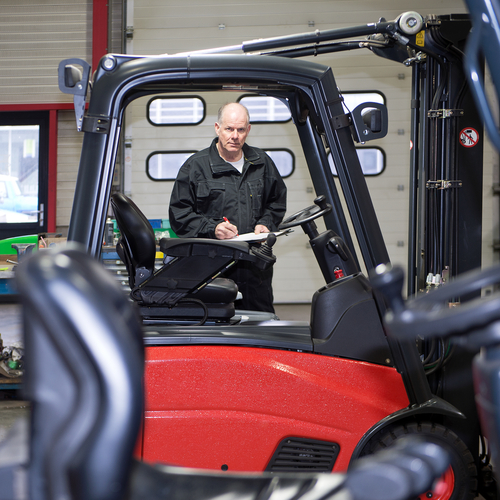When it comes to forklift safety, a lot of emphasis is placed on operators and their training. But maintenance is also critical to forklift safety—and workers who perform forklift repairs and maintenance face hazards that must be addressed with worker training and attention to the work environment.
|
Identifying Maintenance Issues
There are two ways to identify a forklift that is in need of maintenance.
- Daily inspections. Forklift operators are required to inspect forklifts before each shift, for forklifts that are in continuous use. These daily inspections are supposed to identify issues that require attention.
- Malfunctions during use. Sometimes an issue arises while the forklift is in use—the forklift may overheat or dramatically malfunction (sparks or flames coming from the exhaust are one possible example).
Make sure that operators who have identified a potential safety issue with a forklift know to take it out of service immediately until it is repaired.
Great news! BLR’s renowned Safety.BLR.com® website now has even more time-saving features. Take our no-cost site tour! Or better yet, try it at no cost or obligation for a full 2 weeks.
Training for Forklift Maintenance Workers
Only “authorized” persons may make repairs to and perform maintenance on forklifts. A worker’s authorization may be only for a specific task, such as refueling or battery replacement. OSHA’s training requirements for workers who perform forklift maintenance are found in the Powered Industrial Trucks Standard, 29 CFR 1910.178, in paragraphs (f), (g), and (q).
- Fuel handling and storage (1910.178(f)). Workers must know how to properly handle and store fuels. Specifically:
- Liquid fuels (gasoline and diesel fuel) must be stored and handled in accordance with NFPA Flammable and Combustible Liquids Code (NFPA No. 30-1969).
- Liquefied petroleum gas (LPG) fuel must be stored and handled in accordance with NFPA Storage and Handling of Liquefied Petroleum Gases (NFPA No. 58-1969).
- Changing and charging storage batteries (1910.178(g)). Workers who change and charge storage batteries must know:
- To properly position trucks and apply brakes, before attempting to change or charge batteries;
- Not to pour water into acid;
- To assure that vent caps are functioning and that battery (or compartment) cover(s) are open to dissipate heat;
- Not to smoke in the charging area;
- To take precautions against open flames, sparks, or electric arcs in battery charging areas; and
- To keep tools and other metallic objects away from the top of uncovered batteries.
- Maintenance of Industrial Trucks (1910.178(q)). Forklift maintenance workers should know, at a minimum:
- To repair the fuel and ignition systems of industrial trucks only in locations designated for such repairs;
- To disconnect the batteries of trucks before repairing electrical systems;
- To only use replacement parts that are equivalent with respect to safety to the truck’s original parts;
- Not to alter industrial trucks so that the relative positions of the various parts are different from what they were originally;
- Not to add extra parts not provided by the manufacturer without the manufacturer’s approval; and
- Not to eliminate parts without manufacturer’s approval.
Tomorrow we’ll look at some additional requirements that may apply to your forklift maintenance personnel and to the space they work in. |

